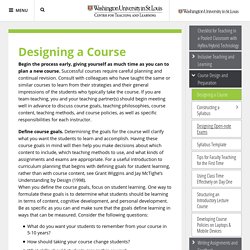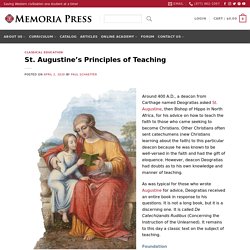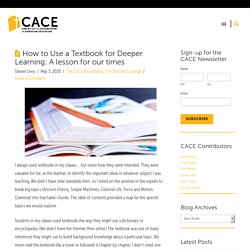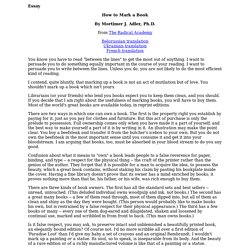

Note-taking: A Research Roundup. Course Design: Planning a Class. Self-Directed Learning: A Four-Step Process. Designing a Course. Begin the process early, giving yourself as much time as you can to plan a new course.

Successful courses require careful planning and continual revision. Consult with colleagues who have taught the same or similar courses to learn from their strategies and their general impressions of the students who typically take the course. If you are team-teaching, you and your teaching partner(s) should begin meeting well in advance to discuss course goals, teaching philosophies, course content, teaching methods, and course policies, as well as specific responsibilities for each instructor.
Define course goals. Determining the goals for the course will clarify what you want the students to learn and accomplish. What do you want your students to remember from your course in 5-10 years? Benjamin Bloom’s Taxonomy of Educational Objectives (1956) provides a helpful framework for identifying the observable and measurable skills you would like your students to learn. General Chemistry: Course Goals. UDL: The UDL Guidelines.
About Universal Design for Learning. St. Augustine's Principles of Teaching. Around 400 A.D., a deacon from Carthage named Deogratias asked St.

Augustine, then Bishop of Hippo in North Africa, for his advice on how to teach the faith to those who came seeking to become Christians. Other Christians often sent catechumens (new Christians learning about the faith) to this particular deacon because he was known to be well-versed in the faith and had the gift of eloquence. However, deacon Deogratias had doubts as to his own knowledge and manner of teaching.
As was typical for those who wrote Augustine for advice, Deogratias received an entire book in response to his questions. It is not a long book, but it is a discerning one. Foundation All the advice Augustine gives on teaching rests on one bedrock precept: There must be a relationship between the student and the teacher. The application of this advice in a homeschool setting might seem obvious—of course you love your child! Love is more than a feeling; it is also an act. Principles. How to Use a Textbook for Deeper Learning: A lesson for our times.
I always used textbooks in my classes … but never how they were intended.

They were valuable for me, as the teacher, to identify the important ideas in whatever subject I was teaching. We didn’t have state standards then, so I relied on the wisdom of the experts to break big topics (Ancient History, Simple Machines, Colonial Life, Force and Motion, Grammar) into teachable chunks. The table of contents provided a map for the specific topics we would explore. Students in my classes used textbooks the way they might use a dictionary or encyclopedia. (We didn’t have the Internet then either.)
Most textbooks are written with the intention of providing important facts and information about a certain subject. What’s this? I am going to ask you to pause and do something I would probably not do myself. If we were in class together, I’d invite you to share your “story” in triads. Now my students (and hopefully, you) have a theory as it were, a prediction, an inference, a “stake in the outcome.” Late Work Policy Options for Secondary Classrooms. Meet the Single Point Rubric. A Step-by-Step Plan for Teaching Argumentative Writing. Adler. Essay How to Mark a Book By Mortimer J.

Adler, Ph.D. from The Radical Academy Belorussian translation Ukrainian translation French translation You know you have to read "between the lines" to get the most out of anything. I contend, quite bluntly, that marking up a book is not an act of mutilation but of love. Librarians (or your friends) who lend you books expect you to keep them clean, and you should. There are two ways in which one can own a book. Confusion about what it means to "own" a book leads people to a false reverence for paper, binding, and type -- a respect for the physical thing -- the craft of the printer rather than the genius of the author. There are three kinds of book owners. Is it false respect, you may ask, to preserve intact and unblemished a beautifully printed book, an elegantly bound edition? But the soul of a book "can" be separate from its body. Why Settle for Merely Reading a Book When You Can Master It?
How to Read Less More, and Twice as Fast If you're like me, you really want to read more effectively, but you don't know how and can't find the time.

Solomon wrote, "The writing of many books is endless, and excessive devotion to books is wearying to the body. "* I agree. The stacks of unopened volumes in my own library weary me just looking at them. To make matters worse, even the good books we read teach us nothing. I have a plan to change that. The idea raises two practical problems. Four Pages a Day Don't think you've got to read 50, 25, or even 10 books a year to stay educated, informed, and equipped. For some of you the idea may seem overwhelming. What to Do on Lame Duck School Days.